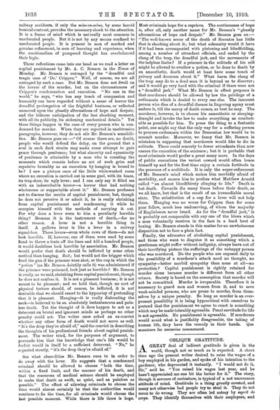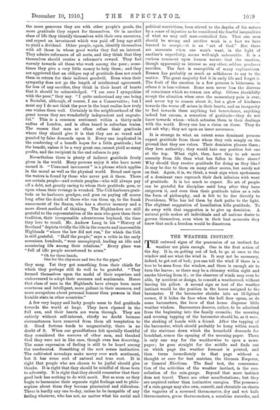OBLIQUE GRATITUDE.
AGREAT deal of indirect gratitude is given in the world, though not so much as is expected. A short time ago the present writer desired to raise the wages of a boy employed in his garden, and spoke of his intention to the gardener, who deprecated it instantly. " I would not do it, Sir," said he. " You raised his wages last year, and he hasn't appreciated me one bit the better for it." The story, though it savours of caricature, is typical of a not uncommon attitude of mind. Gratitude is a thing greatly coveted, and many not otherwise bad people try to steal it. They do not mean to do wrong. They are often led astray by esprit de corps. They identify themselves with their employers, and
the more generous they are with other people's goods, the more gratitude they expect for themselves. Or in another class of life they identify themselves with their own ancestors, and expect an investment which was paid off long ago still to yield a dividend. Other people, again, identify themselves with all those in whose good works they feel an interest. They admire reformers of all sorts, and they think that they themselves should receive a reformer's reward. They feel warmly towards all those who work among the poor ; some- times they give a very little money to help them ; and they are aggrieved that an oblique ray of gratitude does not reach them in return for their indirect goodwill. Even when their sympathy does not go the length of intellectual agreement, far less of any sacrifice, they think in their heart of hearts that it should be acknowledged. "I am sure I sympathise with the poor," they say. " I quite understand any one being a Socialist, although, of course, I am a Conservative ; but I must say I do not think the poor in the least realise how truly one wishes them well. Certainly in the neighbourhood of the great towns they are wonderfully independent and ungrate- ful." This is a common sentiment within a thirty-mile radius of London, and is often heard in suburban trains. The reason that men so often refuse their gratitude where they should give it is that they are so vexed and puzzled by false demands upon it. Every one implicated in the conferring of a benefit hopes for a little gratitude ; but the benefit, unless it be a very great one, cannot yield so many profits, and the recipient in the end refuses to pay.
Nevertheless there is plenty of indirect gratitude freely given in the world. Many persons enjoy it who have never earned it. " Unearned increment " is a phrase which applies in the moral as well as the physical world. Bread cast upon the waters is found by those who never put it there. There are certain people--and certain peoples—who will always pay off a debt, not greatly caring to whom their gratitude goes, or upon whom their revenge is wreaked. The Celt harbours grati- tude as he harbours grudges, and goes on paying off scores long after the death of those who ran them up, to the frank amazement of the Saxon, who has a shorter memory and a more direct method of thinking. The Highlanders are still grateful to the representatives of the men who gave them their tradition, their irresponsible adventurous boyhood, the time they love to recall. Mr. Andrew Lang in his " History of Scotland " depicts vividly the life in the remote and inaccessible Highlands " where the law did not run," for which the Celt is still grateful. " Half the people," says a critic in the early seventeen hundreds, " were unemployed, leading an idle and sauntering life among their relations." Every place was " full of idle people accustomed to arms."
" Oh for three hands, One for the claymore and two for the pipes," they sang. Yet they got something from their chiefs for which they perhaps still do well to be grateful. " They formed themselves upon the model of their superiors and endeavoured to adopt their manners and sentiments. Hence that class of men in the Highlands have always been more courteous and intelligent, more gallant in their manners, and more scrupulous about personal honour than persons in that humble state in other countries."
A few very happy and lucky people seem to feel gratitude towards the world at large. They have ripened in the full sun, and their hearts are warm through. They are entirely without self-interest, chiefly no doubt because circumstances have removed from them all temptation to it. Good fortune tends to magnanimity, there is no doubt of it. When our grandfathers felt specially thankful they considered the sorrows of other men, and thanked God they were not in like case, though even less deserving. The same expression of feeling is still to be heard among the uneducated. Something of the sort seems instinctive. The cultivated nowadays make merry over such sentiment, but it has some sort of natural and true root. It is right 'that people who are chosen to be joyful should give thanks. It is right that they should be mindful of those born to adversity. It is right that they should remember that their good luck has nothing to do with merit. But as soon as they begin to harmonise their separate right feelings and to philo- sophise about them they become pharisaical and ridiculous. There is hardly any one to-day, unless he be incapable of any feeling whatever, who has not, no matter what his social and
political convictions, been stirred to the depths of his nature by a sense of injustice as he considered the fearful inequalities of what we may call man-controlled fate. That one man should be strong and another weak is a fact we have learned to accept,—it is an " act of God." But there are moments when one man's want, in the light of another's superfluity, seems well-nigh unbearable. It is a curious comment upon human nature that the emotion, though apparently as intense as any other, seldom produces sacrifice. The fact is susceptible of many explanations. Reason has probably as much as selfishness to say to the matter. The great majority feel it in early life and forget it. The fruit of the emotion in a few persons is bitterness, in others it is benevolence. Some men never lose the distress of conscience which no reason can allay. Others thankfully accept the situation when once the momentary pain is over, and never try to reason about it; but a glow of kindness towards the worse off arises in their hearts, and an incapacity to feel towards them anything but benevolence, anything indeed but excuse, a sensation of gratitude—they do not know towards whom—which actuates them in their dealings with the world. Every one has a claim on them. They do not ask why; they act upon an inner assurance.
It is strange to what an extent some dominant persons expect gratitude from those whom they rule simply on the ground that they are rulers. Their dominion pleases them ; they love authority; they would hate any position but ono at the top. What right, then, have they to ask more amenity from life than what has fallen to their share ? Why should they receive gratitude for doing as they like ? It may be due to them on many other scores, but surely not on that. Again, it is, we think, a weak sign when spokesmen of a dominant race reproach their dark inferiors with want of gratitude. It is too mach to expect. No set of people can be grateful for discipline until long after they have outgrown it, and even then their gratitude takes as a rule the form of philosophy, and is felt to be due directly to Providence, Who has led them by dark paths to the light. The slightest suggestion of humiliation kills gratitude. To do away with that suggestion is to give up dominion. A natural pride makes all individuals and all nations desire to govern themselves, even when in their best moments they know that such a freedom would be disastrous.



























































 Previous page
Previous page